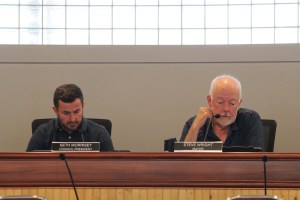Undocumented immigrants could get driver’s licenses under state House bill
Published 11:44 am Sunday, May 12, 2019
SALEM — Undocumented immigrants and others who can’t prove they are in the country legally could get a driver’s license under a proposal in the state House.
Trending
With less than two months before the Legislature adjourns, though, there has been no action since lawmakers on the Joint Committee on Transportation took testimony on the bill in mid-April. The committee is scheduled to work on the bill in about two weeks.
Supporters say the bill, by allowing drivers who are undocumented to get licensed and to get car insurance, could make roads safer, potentially reducing the number of hit-and-runs by uninsured drivers.
They say that if the bill is passed, undocumented immigrants would no longer need to rely on their teenage children or other people with legal status to get to work or other obligations — especially in the state’s rural areas, where driving long distances is par for the course.
Trending
The bill would direct the state Department of Transportation to start offering licenses to people without proof of legal status starting in 2021.
Thirty-six sponsors
The bill has 36 sponsors in the House — more than half of all its members.
One of the bill’s chief sponsors, state Rep. Diego Hernandez, D-Portland, said that’s far from a guarantee that House Bill 2015 will pass.
Hernandez hopes the bill will wind its way from committee, to the budget committees, and to each chamber.
“But we’re running out of time,” Hernandez said. “So anything can happen.”
Sen. James Manning, D-Eugene, another chief sponsor of the measure, said he believes a majority of his Senate colleagues support clearing a path to driver’s licenses.
“I think that the majority of my colleagues would support a safety bill like this,” Manning said. “Everyone has their own bills that they’re trying to move forward, so it’s a bit of a little shuffle … But I intend to carry this message through and have one-on-ones with people that have any questions about the bill.”
Manning served in the Army for 24 years, a tenure that included stints abroad.
During an interview, he held up the driver’s license he obtained while serving in Panama.
“The only thing that this entitled me to or provided for me, was that I understood the rules of the road and I was able to get insurance,” Manning said. “Nothing more, nothing less.”
Manning stresses that the bill is “about safety.”
All people living in the U.S. have to pass tests and get cleared to drive, he said.
“We want to make sure that if you’re here temporarily or long term and you’re going to navigate our roads, we want to make sure that you’re properly licensed,” Manning said. “And again, getting a driver’s license is a privilege, it’s not a right. Because you’re an American citizen, that doesn’t mean you have the right to drive. You have to prove that you qualify to drive.”
Causa, an immigrants’ rights organization, estimates that up to 100,000 people living in Oregon could be eligible.
The measure wouldn’t impact only undocumented immigrants.
Even U.S. citizens who, for whatever reason, may not have access to documents proving their legal presence would be able to get driving privileges by passing the required tests.
That includes people who are homeless and survivors of domestic violence.
Abusive partners can hold vital records hostage or destroy them, according to Jessica Mathis, a housing coordinator for Bradley Angle, a Portland shelter.
“When survivors are unable to drive, they can’t maintain the jobs they need in order to support their families and leave abuse,” Mathis said in written testimony. “Without the ability to go to work, access social services, or take their children to school they often have to return to their abuser. Having to choose between safety and driving illegally is not only bad for these families, but the community. We are all impacted by the increased safety and financial risk of unlicensed and uninsured drivers.”
Political climate
In late 2007, then-Gov. Ted Kulongoski, a Democrat, issued an executive order saying that people applying for driver’s licenses, driving permits and ID cards in Oregon had to document their citizenship or that they were in the U.S. legally.
Six years later, lawmakers moved to create a special driver’s card program for undocumented immigrants, but opponents sent the measure to the ballot, where voters rejected it.
Supporters of the new bill believe the political environment around immigration has changed in the wake of the 2016 presidential election.
They point to the failure of Measure 105, a ballot measure last November that would have repealed Oregon’s decades-old law that prevents state and local law enforcement for expending resources to arrest people whose only violation of the law is being here without legal permission.
“In the past several years, the context around immigration has changed completely around the country and around our state,” said Iván Hernández, communications manager for Causa. “We saw that with Measure 105 …when Oregonians voted overwhelmingly to protect our immigrant neighbors by protecting the state’s anti-discrimination and anti-racial profiling laws and the state sanctuary law.”
Others, however, have objected to the idea.
Keith Rosenstrater, of Salem, urged lawmakers to reject the measure because it “legitimizes illegal immigration, devalues citizenship and threatens the sovereignty of our state and nation.”









